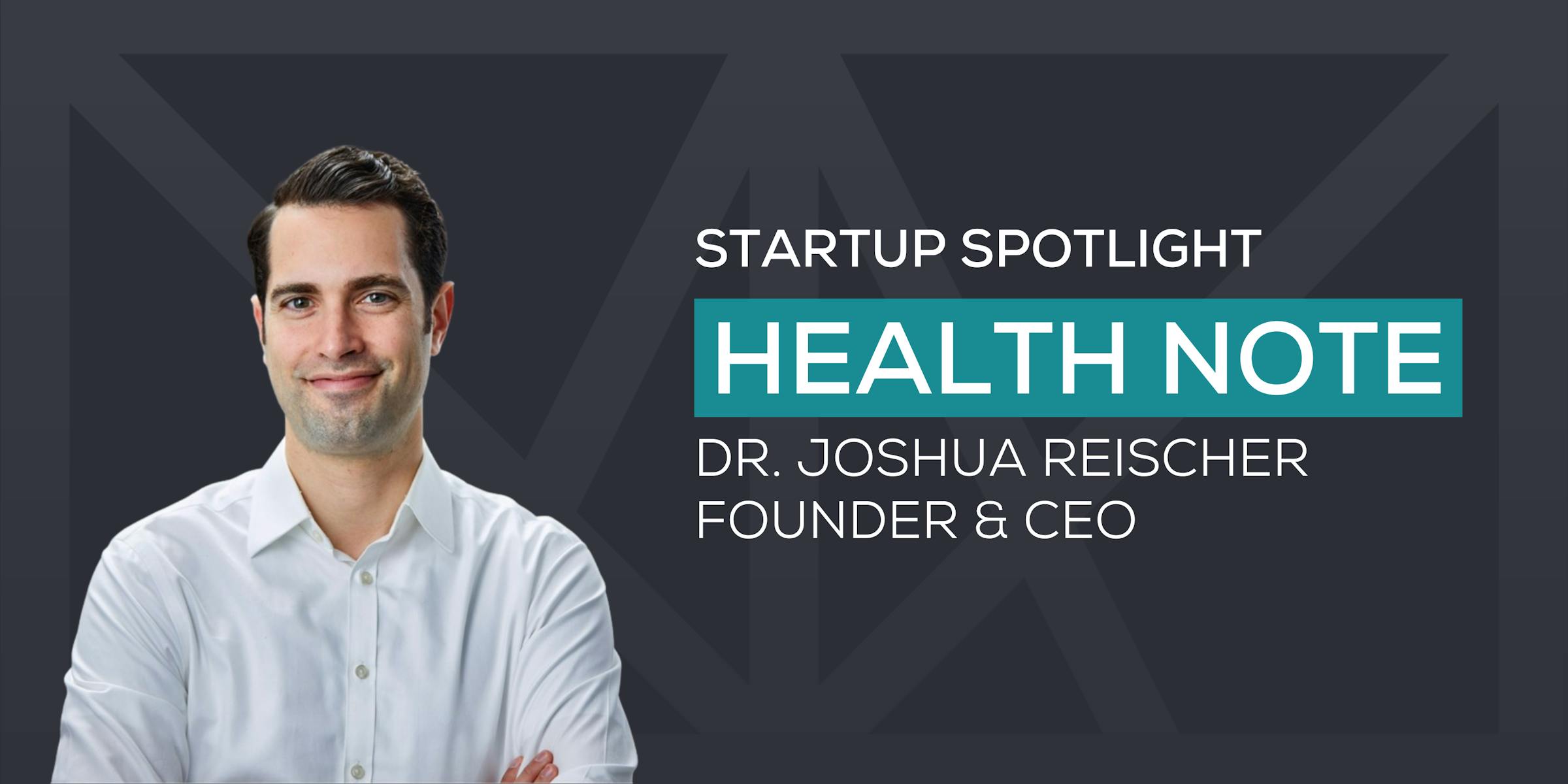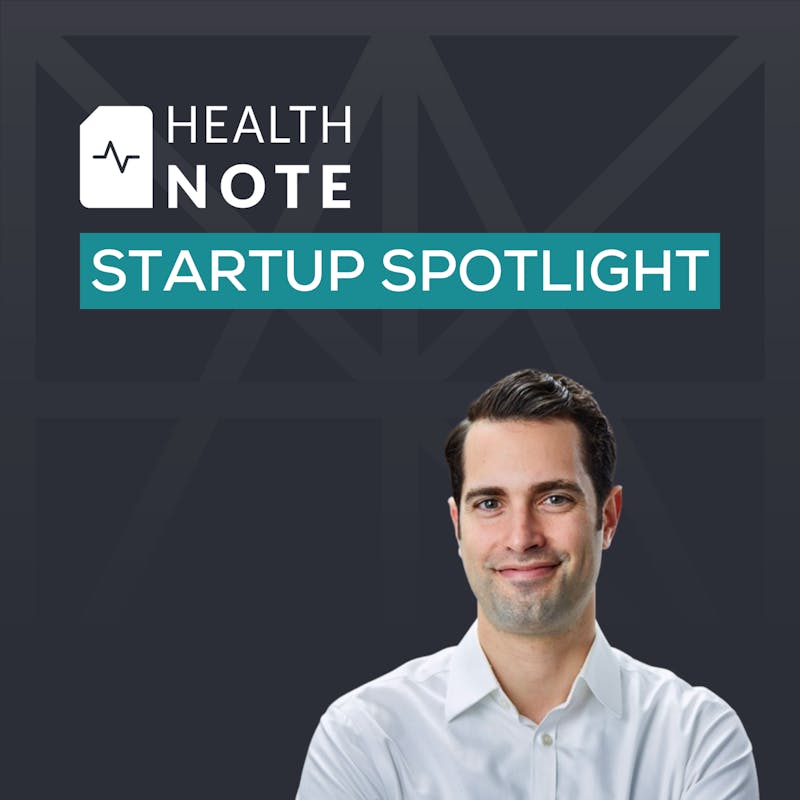MATTER Startup Spotlight: Health Note
Simplifying EMR data entry by empowering patients to take control of their own health records
Healthcare providers are burdened with an increasing amount of administrative tasks, leading to inefficiencies, less time spent with patients, burnout and more. To lessen this burden, innovators have developed numerous solutions from automation and dictation tools to artificial intelligence-based solutions.
MATTER member Dr. Joshua Reischer, founder and CEO of Health Note, sat down with MATTER to discuss how Health Note is automating clinical note taking through modernizing patient engagement before, during and after the appointment. Read on to learn more about their solution and Dr. Reischer’s background as a physician turned entrepreneur.
Responses have been edited for length and clarity.
MATTER: Tell me about the Health Note solution.
Dr. Reischer: Health Note is a platform that makes it simple for clinics and hospitals to gather information from patients before they show up for a visit. We text or email patients a link to our platform several days before their visit, whether in person or via telemedicine. There’s no download or sign-in process. When the EHR signals an upcoming appointment, we text or email the patient to both remind them of the appointment and start patient intake. Then, our chatbot asks questions a doctor would ask at the appointment about the reason for the visit and the patient’s history. We take that information and put it directly into the provider’s medical record system, and it’s not a PDF that’s added to the chart. It’s as if someone else typed the information for them into the EHR.
Clinically, the platform takes patients down different pathways based on their needs. For example, if you’re going to the cardiologist, we’ll ask you questions specific to cardiology. If you’re going to the cardiologist and you have heart failure, we’ll ask more specific questions that the provider would ask, speeding up workflow for physicians, nurse practitioners, physician assistants, medical assistants and receptionists.
MATTER: What makes Health Note different from other solutions on the market?
Dr. Reischer: The unique part of what we do is the clinical component. There are a lot of what we consider “generation one” intake platforms that ask basic screening questions and essentially digitize paperwork, which we accomplish as well. On top of that, Health Note asks relevant questions to enable providers to take better care of their patients. They receive all necessary information in an intuitive format, reducing their workload. They don’t have to type up or dictate notes; it’s already in the chart, enabling providers to get to the meat of the patient’s concerns right away while still having a comprehensive understanding of what’s going on with the patient in front of them.
“It’s already in the chart, enabling providers to get to the meat of the patient’s concerns right away while still having a comprehensive understanding of what’s going on with the patient in front of them.”
MATTER: Can you share the Health Note story?
Dr. Reischer: I started my first company while I was in residency at a veteran’s hospital. The company was an in-home, on-demand house call app — essentially Uber for doctors. I realized that at times, we were unable to get to people’s homes who needed help and that we were going to people’s homes who didn’t actually need help. I took the company through Y Combinator, an accelerator for early-stage startups, and that’s where I met my co-founder of Health Note, Aaron Rau.
After the accelerator, I worked as a provider for another clinic, and I shared with Aaron some of my frustrations regarding the amount of time I spent collecting, organizing and documenting information. He said, “Hey, I think there’s something I can do for you,” and he showed me an idea he had. I said, “My patients are older and not very tech-savvy. I don’t think that’s going to work.”
He came back about five days later and showed me something new, and I was instantly interested. We showed it to a former colleague of mine’s family member who has a gastrointestinal clinic in Los Angeles. He said, “How much does it cost? When can I get it?” And that was the genesis of how we started. Within about a month we had our first customer, and now we have about 50 customers and about 200 locations across the U.S.
MATTER: What other milestones have you reached along the way?
Dr. Reischer: Last year, we saw about one million patient visits on our platform — we saw about 5,000 visits in our first year, so we’ve come a long way. This year, we expect to see between four and five million visits.
Another key utilization metric is the percentage of patients who fill out our questionnaires. What differentiates us from other platforms is our ease of use. More than 80 percent of patients fill out the questionnaire prior to their appointment, which is an extraordinarily high rate; typically, only five to 15 percent of patients fill something out before a visit.
MATTER: Have you faced any challenges along the way?
Dr. Reischer: There are always challenges in starting a new business. Learning how to tell the story and enabling other people to understand what you’re building and the problem you’re trying to solve can be a daily occurrence.
We had to teach providers why they needed pre-written notes — we knew documentation and provider burnout were issues, but very few providers thought of pre-written notes as a solution. For example, when the iPhone first came out, people weren’t begging for a computer that you could hold in your hand. Steve Jobs had to show people the iPhone, its capabilities and the value it provided, and now it’s changed the world.
We face the same challenge where we have to show people a demo of the platform so they can see it happening in real-time to illustrate how we gather information directly from the patient and put it together in a way that’s digestible for providers. Also, many health systems still use legacy software for their medical record systems which can pose unique integration challenges. Another challenge is handling sensitive patient data.
MATTER: What’s your background, and how did it prepare you for Health Note?
Dr. Reischer: I originally studied political science and business during undergrad. When I went back to school to take my prerequisites for medical school, I worked on HIV research at Mount Sinai in New York. I then got my first taste of a startup working for a biotech startup in Israel. I found it exciting working on something that could affect thousands, tens of thousands, maybe even hundreds of thousands of people. At med school, I focused on internal medicine, which is essentially primary care and hospital medicine.
I find the parallels between medicine and entrepreneurship interesting. Medicine has many challenges: a lot of long, difficult days and scenarios you can’t predict. Entrepreneurship is very much the same where you have your schedule, but you don’t actually know what’s going to happen. Change is constant, and you need to be able to pivot with it and go whichever way things are happening. You also need to be able to put in long hours.
“Medicine has many challenges: a lot of long, difficult days and scenarios you can’t predict. Entrepreneurship is very much the same where you have your schedule, but you don’t actually know what’s going to happen. Change is constant, and you need to be able to pivot with it and go whichever way things are happening. You also need to be able to put in long hours.”
However, while there are many parallels, for the most part, nobody is dying in front of me as an entrepreneur. It is by no means easy, but when you put things into perspective, a bad day is never that bad. I think medicine absolutely prepared me for entrepreneurship.
MATTER: What inspired you to switch from business and political science to medicine?
Dr. Reischer: I studied in Sydney, Australia, focusing primarily in politics. During my time there, I volunteered in a children’s hospital, and I felt that nothing would satisfy me like the way a provider helps their patient. I no longer feel that way, but at the time I felt that’s what would make me happy and be the best way that I could contribute to society. Specifically, I went into internal medicine because I liked the longitudinal relationships that physicians had with patients. You can take care of one person, and sometimes entire families, for a long period of time.
Now, I feel that the impact we’re able to make is scalable. For example, on our platform, we’ve seen more visits than I could have in my entire life alone. When you’re working on a project with other great people, you can accomplish way more, which is why I’ve shifted my focus to entrepreneurship.
MATTER: Do you have any advice based on your experience for other entrepreneurs who may be just starting out on their journey?
Dr. Reischer: Starting is probably the hardest part. It’s okay to fail. It’s okay to not know what you’re doing at first, but you have to keep on going at it. I think the hardest thing to know is when to continue and when to stop because sometimes you don’t know if something isn’t working because you’re new at it or if it’s not actually a feasible solution.
I would recommend joining a community and seeking mentorship. If you’re trying to do it alone, it’s very, very difficult.
MATTER: What value have you gained from the MATTER community?
Dr. Reischer: Being part of the MATTER community has helped not just with customer introductions but has also provided a neutral sounding board on various items we’ve worked on. We’ve received helpful feedback from people who understand the space we’re working in.
About Health Note
Health Note maximizes practice performance by transforming patient appointment reminders, digital patient intake, and electronic check-in into a single solution that becomes the epicenter of practice efficiency. By empowering patients to update their health records via a conversational chatbot before the visit and automating clinical notes, Health Note creates faster check-in, faster rooming, better patient-provider conversations, and a better experience for everyone. To learn more, visit www.healthnote.com.
About MATTER
At MATTER, we believe collaboration is the best way to improve healthcare. The MATTER collaborative includes more than 700 current and alumni startups from around the world, working together with dozens of hospitals and health systems, universities and industry-leading companies to build the future of healthcare. Together we are accelerating innovation, advancing care and improving lives. For more information, visit matter.health and follow @MATTERhealth.




